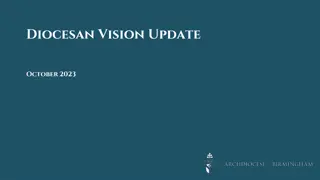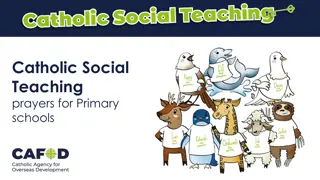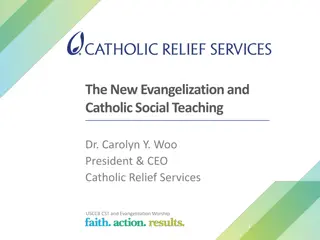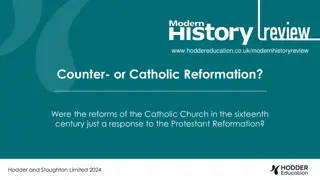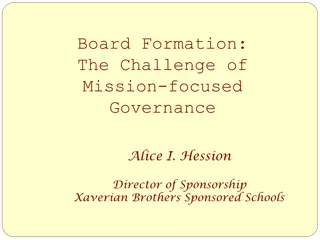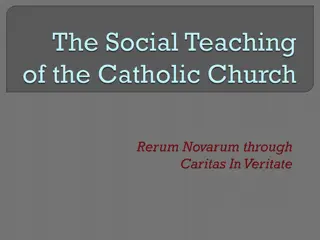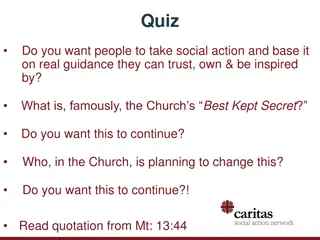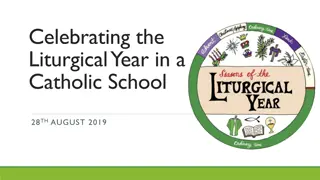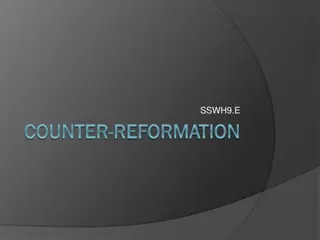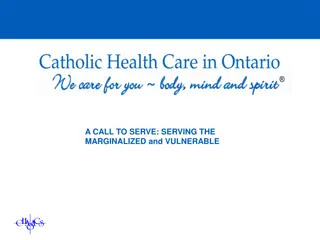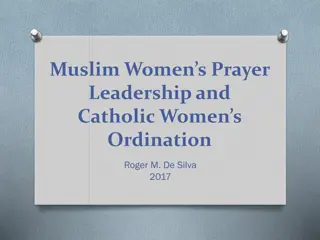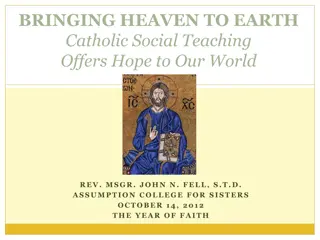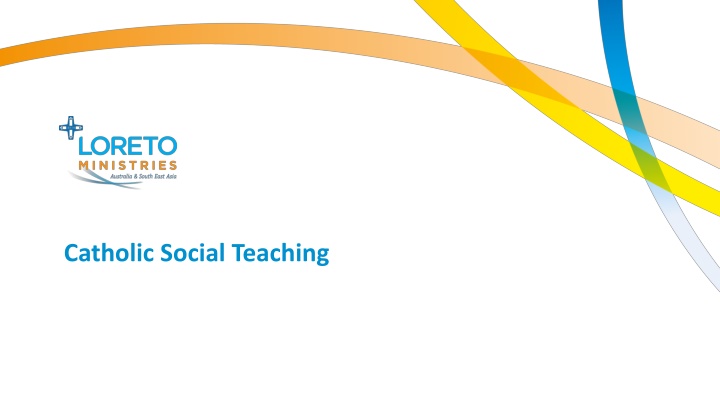
Catholic Social Teaching
Explore the essence of Catholic Social Teaching (CST), its principles rooted in Scripture and Church documents, and the significant influence of figures like Mary Ward. CST focuses on social, economic, and ecological justice, emphasizing the importance of social justice, reforming unjust systems, and living by the values exemplified by Jesus and Mary Ward.
Download Presentation

Please find below an Image/Link to download the presentation.
The content on the website is provided AS IS for your information and personal use only. It may not be sold, licensed, or shared on other websites without obtaining consent from the author. If you encounter any issues during the download, it is possible that the publisher has removed the file from their server.
You are allowed to download the files provided on this website for personal or commercial use, subject to the condition that they are used lawfully. All files are the property of their respective owners.
The content on the website is provided AS IS for your information and personal use only. It may not be sold, licensed, or shared on other websites without obtaining consent from the author.
E N D
Presentation Transcript
Intention Explore Catholic Social Teaching (CST) What it is The principles of CST The background of CST In Scripture In significant Church documents In Mary Ward s Vision Contribute to an appreciation educating for justice as a contribution to the social mission of the Church, a mission that is understood through the example of a way of life that was revealed by Jesus and embraced by Mary Ward.
What is Catholic Social Teaching? CST Catholic Social Teaching (CST) is the part of Catholic teaching that addresses matters of social, economic and ecological justice in the world. CST: - concerns respect for life, the human person and the rights and duties which flow from human dignity and guarantee it. - teaches a way of seeing, judging and acting that supports the development of social justice.
What is Catholic Social Teaching? Social Justice Directed towards reforming unjust systems or structures in society to try and create a more just society. Society ensures social justice when it provides the conditions that allow associations or individuals to obtain what is their due, according to their nature and their vocation. CCC, 1928
What is Catholic Social Teaching? CST Grounded in Scripture, the lived tradition of the Church, experience and magisterial teachings *. Develops through time by placing these sources in dialogue with the signs of the times . *Magisterial teachings - the teaching authority of the Church.
What is Catholic Social Teaching? CST Lived in Jesus example of Challenging unjust structures Speaking up for the poor Promoting and practicing Scriptural values of compassion, mercy, forgiveness Taking action to bring God s love to people in need In the Loreto context seek truth and do justice and go where the need is greatest Mary Ward
What is Catholic Social Teaching? A Key to Catholic Identity The central message is simple: our faith is profoundly social. We cannot be called truly Catholic unless we hear and heed the Church's call to serve those in need and work for justice and peace. Communities of Salt and Light, U.S. Bishops, 1993 .
The Principles of Catholic Social Teaching 1. Human Dignity 6. Economic Justice 2. Common Good / Community 7. Stewardship of Creation 3. Rights and Duties 8. Solidarity 4. Preferential Option for the Poor 9. Role of Government / Subsidiarity 5. Participation 10. The Promotion of Peace
The Principles of CST 1. Human dignity: the person is sacred, made in the image and likeness of God. 2. Common Good/Community: humans are social by nature - the betterment of the person and the improvement of society depend on each other. 3. Rights and Duties: every person has a right to the basic material necessities that are required to live a decent life. 4. Option for the Poor: remember `the widows, orphans and aliens ; a necessary element of the common good. 5. Participation: all people have a right to the minimum level of participation in the economic, political and cultural life of society.
The Principles of CST 6. Economic Justice: the economy must serve people, not the other way around. People are more important than things. 7. Stewardship of Creation: the goods of the earth are gifts, we hold them in trust as stewards. 8. Solidarity: we are all one and responsible for all 9. Role of Government: the State has a moral function to protect and promote human dignity and build the common good. It is to practice subsidiarity. 10. Promotion of Peace: Peace is not just the absence of war - if you want peace, work for justice.
The Principles of CST 6. Economic Justice 1. Human Dignity 7. Stewardship of Creation 2. Common Good / Community 8. Solidarity 3. Rights and Duties 9. Role of Government / Subsidiarity 4. Preferential Option for the Poor 10. The Promotion of Peace 5. Participation
CST and the Scriptures At the heart of the Old and New Testaments In Luke (Lk 4:18-19), Isaiah (Is 61:1) is quoted: The Spirit of the Lord is upon me, because he has anointed me to bring good news to the poor. He has sent me to proclaim release to the captives and recovery of sight to the blind, to let the oppressed go free, to proclaim the year of the Lord s favour.
CST A Way of Living the Mission See, Judge, Act See the facts; know the reality Use social analysis and moral values to make judgments about the facts Plan a realistic and effective strategy for action .
Catholic Social Justice A Summary Catholic Social Justice teaches us that all people are made in the image of God and so possess an equal and inalienable worth. Because of this essential dignity, each person has a right to all that is needed to allow him or her to live their full potential as intended by God. As God is love, we were created to love and be in relationship with each other. https://networkadvocates.org/advocacytoolbox/educate/catholicsocialjustice/
Mary Wards Sense of Justice Flowed from Mary s love of God and her faith in God s love for her. Mary s response to this love was love. From a transformed heart, good works, or works of justice , flow
THANK YOU Carolyn Young BA (Hons.), GradDipEd (Sec.), MRE, MEdLead, MBA (Exec) Director of Mission and Identity Tel: 0460 034 208 | Email: carolyn.young@loretoministries.org.au



